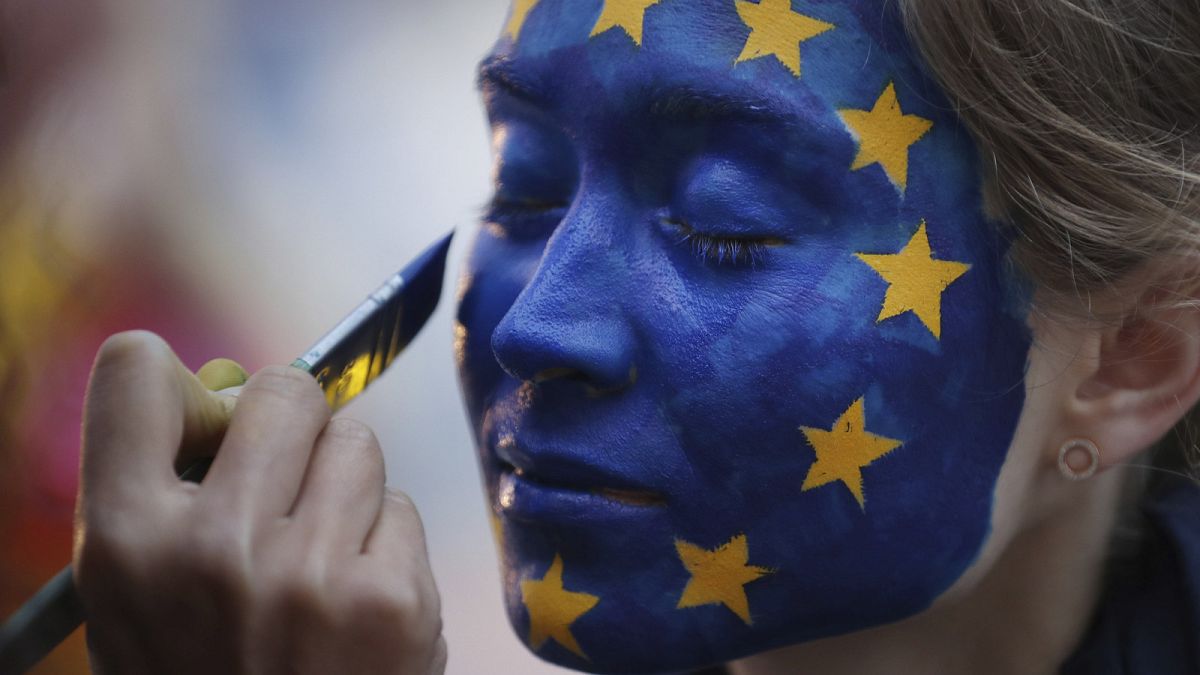Voter interest in the 2024 European elections is on the rise, but projections of a surge in support for far-right parties are sowing doubts over the European Union's future path.
More than half (57%) of EU citizens are interested in the upcoming European elections six months before the ballot opens, a substantial 6 percentage points higher than ahead of the previous election in 2019, according to survey results unveiled by the European Parliament on Wednesday.
The European elections take place every five years across the EU's 27 member countries, with voters choosing who represents them in the European Parliament, the bloc's only democratically-elected institution.
If the election was held next week, 68% would cast their vote according to the survey, 9 percentage points more than in 2019.
But despite this rosy outlook, projections of a surge in support for far-right parties amid recent electoral victories in many EU countries are casting doubts over the future of the Union.
The European Parliament's spokesperson Jaume Duch told Euronews that a shift to the right in the parliament's make-up will not necessarily erode the EU's role, despite some far-right parties' eurosceptic origins.
"The parties that were previously practically supporters of leaving the European Union are now making other kinds of proposals that no longer involve leaving - because it’s very cold out there - but rather proposals that aim to adapt the European Union to how they consider it should be," Duch explained.
"I prefer that the European Union not only continues to work as it has done until now, but that it can also work better, because that will benefit us all," he added.
According to poll aggregator Europe Elects' latest projection, the European Parliament's right-wing Identity and Democracy (ID) group - home to far-right parties such as France's Rassemblement National and Germany's Alternative für Deutschland - could gain as many as 11 seats in June's vote.
The recent shock victory of populist Geert Wilders in November's Dutch elections has been the latest in a string of triumphs for Europe's far-right. During the current five-year term of the European Parliament, far-right parties in Italy, Finland, and Sweden have celebrated significant electoral triumphs, and are surging in the German, French and Austrian polls.
Electoral enthusiasm uneven across the EU
The European Parliament survey also reveals stark discrepancies in the level of interest in the EU elections among social groups.
While 74% of those who follow EU politics expressed interest, the number plummets to 34% among those who don't.
Interestingly, 50% of younger voters are interested compared to 57% to 59% among other age groups, despite the younger generation being more favourable to the European project.
Most notably, interest in the election fluctuates significantly between EU countries, ranging from a high of 69% in the Netherlands to a low of 28% in the Czech Republic.
The likelihood to vote, which stands at an average of 68% across the block, also varies by country, with Danes most likely to go to the ballot and the Cypriots the least likely.
In 24 of the bloc's 27 countries, citizens are more likely to vote than in 2019, with the most significant increases seen in Poland (23%) and Slovakia (20%).
Both countries have seen a dramatic shift in their political leadership in recent months. Pro-EU Donald Tusk is set to try to form a government after garnering enough votes in the October Polish elections, following eight years of hard right governance under the Law and Justice party. In Slovakia, left-wing populist Robert Fico formed a new government in October, after vowing to challenge key EU decisions.
Majority back EU
According to the poll, 61% of Europeans believe EU membership is a good thing, up slightly from 59% ahead of the 2019 elections and significantly higher than its low of 47% in May 2011.
The figure rises to 70% among 15 to 24-year-olds, the age group also revealed to be less inclined to vote.
Duch told Euronews that the EU's future path is especially critical for young voters.
"The world is a much more complicated place than it was before," he said. "The next generations have even more problems than previous generations had. But this ultimately makes the European project even more valuable."
High youth turnout could deliver a more positive result for pro-EU parties. Austria, Belgium, Germany, Greece and Malta will allow 16 and 17-year-olds to vote in the European elections for the first time in 2024.
Duch also believes that the EU's visibility in times of crisis has helped cement its positive image among voters.
"The fact that the European Union has been capable of successfully negotiating Brexit, of helping citizens during COVID-19 through vaccination campaigns or the recovery plan, uniting in its support to Ukraine during Russia's invasion - I think these moments have given the EU media visibility and that the EU's reaction has given it more credibility," he said.
But when asked if EU membership has benefitted their country, respondents in some member states are significantly less likely to agree than in other countries.
Only a small majority of Austrians (55%) believe their country benefits from EU membership. National elections in the country will coincide with the 2024 European elections, with far-right Freedom Party of Austria of Austria currently topping the poll.
But despite signs of erosion in EU support in some countries, Duch says a lot can change in politics in six months.
"We are seeing in recent national elections that yes there are countries where these (far-right) parties are on the rise, but there are also countries where they are losing ground," he said. "We will see what the result will be in six months. Six months is a very long time in politics, and even longer in European politics."
